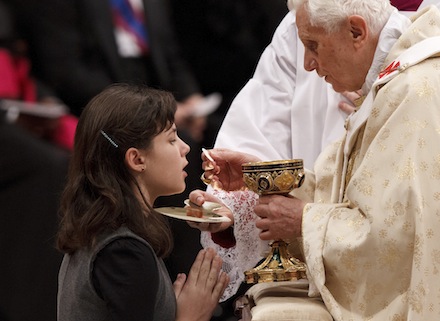Yesterday we took a
look at the very powerful statement of faith we make to God before we approach
the altar for Holy Communion. We proclaim our belief that with one word, God
can take our unworthy souls and forgive our transgressions. We only need to
ask. The centurion was not too proud to ask Jesus for healing for his servant,
and we cannot be too proud to do the same for our souls. Once we ask for this
healing, then God has great things in store for us. Take a look at what he
revealed to St. Faustina, the “Divine Mercy Saint”, and what Blessed John Paul
II, the Divine Mercy Pope, told us.
Matthew 8:5-8: When Jesus had entered
Capernaum, a centurion came to him, asking for help. “Lord,” he said, “my
servant lies at home paralyzed and in terrible suffering.”Jesus said to him, “I
will go and heal him.”The centurion replied, “Lord, I do not deserve to have
you come under my roof. But just say the word, and my servant will be healed. For
I myself am a man under authority, with soldiers under me. I tell this one,
‘Go,’ and he goes; and that one, ‘Come,’ and he comes. I say to my servant, ‘Do
this,’ and he does it.”When Jesus heard this, he was astonished and said
to those following him, “I tell you the truth, I have not found anyone in
Israel with such great faith. I say to you that many will come from the
east and the west, and will take their places at the feast with Abraham, Isaac
and Jacob in the kingdom of heaven. But the subjects of the kingdom will
be thrown outside, into the darkness, where there will be weeping and gnashing
of teeth.” Then Jesus said to the centurion, “Go! It will be done just as
you believed it would.” And his servant was healed at that very hour.
Matthew 7:7-8: Ask and it will be given you…
for everyone who asks receives”
All selections are taken from the Diary of St. Faustina
“Souls that make an appeal to My mercy delight Me. To
such souls I grant even more graces than they ask. I cannot punish even the
greatest sinner if he makes an appeal to My compassion. (337)
No soul that has
called upon My mercy has been disappointed. (339)
Encourage the souls with whom you come in contact to
trust in My infinite mercy. Oh, how I love those souls who have complete confidence
in Me – I will do everything for them. (342)
I desire that the whole world know My infinite mercy. I
desire to grant unimaginable graces to those souls who trust in My mercy. (344)
I am Love and Mercy itself. When a soul approaches me
with trust, I fill it with such an abundance of graces that it cannot contain
within itself, but radiates them to other souls. (345)
I cannot punish
even the greatest sinner if he makes an appeal to My compassion (1146).
Beg for mercy for the whole world (570).
No soul that has called upon My mercy has ever been
disappointed (1541).
August 18, 2002: John Paul II's Homily During
Beatification of 4 Apostles of Mercy
Brothers and Sisters, today I repeat this invitation:
open yourselves to God's greatest gift, to his love that, through the Cross of
Christ, has revealed itself to the world as merciful love. Today, living in
different times, at the dawn of the new century and millennium, continue to be
"ready to bear witness to the cause of man." Today, with all my
strength, I beseech the sons and daughters of the Church, and all people of
good will: never, ever separate "the cause of man" from the love of
God. Help modern men and women to experience God’s merciful love! This love, in
its splendor and warmth, will save humanity!
